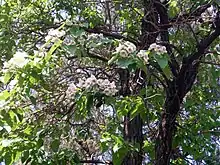| Paulownia fortunei | |
|---|---|
 | |
| Flowers and leaves | |
| Scientific classification | |
| Kingdom: | Plantae |
| Clade: | Tracheophytes |
| Clade: | Angiosperms |
| Clade: | Eudicots |
| Clade: | Asterids |
| Order: | Lamiales |
| Family: | Paulowniaceae |
| Genus: | Paulownia |
| Species: | P. fortunei |
| Binomial name | |
| Paulownia fortunei | |
| Synonyms | |
| |
Paulownia fortunei commonly called the dragontree, dragon tree or Fortune's empress tree, is a deciduous tree in the family Paulowniaceae, native to southeastern China (including Taiwan), Laos and Vietnam. It is an extremely fast-growing tree, due to its use of C4 carbon fixation,[3] and is planted for timber harvesting. It appears to be nowhere near as dangerously invasive as Paulownia tomentosa.
Uses
Aside from its use as a cheap timber tree, it is being studied for use in phytoremediation and carbon sequestration. P. fortunei is cultivated as an ornamental tree in parks and gardens. Its cultivar Fast Blue='Minfast' has gained the Royal Horticultural Society's Award of Garden Merit.[4]
References
- ↑ J. Linn. Soc., Bot. 26: 180. 1890
- ↑ J. Bot. 5: 373. 1867
- ↑ "Microbial diversity of Paulownia spp. leaves – A new source of green manure". Retrieved 24 June 2021.
- ↑ "Paulownia fortunei Fast Blue = 'Minfast'". Retrieved 27 August 2019.
This article is issued from Wikipedia. The text is licensed under Creative Commons - Attribution - Sharealike. Additional terms may apply for the media files.